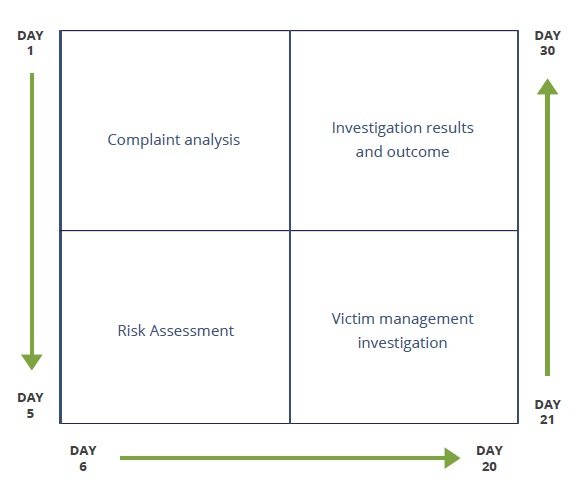Running a startup in its early stages is exciting, but it is also stressful.
The culture is all about getting the business off the ground, and the focus is on growth. Everything else is superfluous, and this includes employee operations because there is simply no time to focus on this.
The founders/leaders will often assume that everyone will automatically be happy and understand their roles and expectations as after all, they are all there to achieve the same vision. However, what they fail to understand is that this is rarely the case. There will be many ups and downs, debates about future direction and growth, and it will be an environment rife with change, uncertainty and interpersonal conflict.
There is no HR department at this stage, so the people dealing with conflict here are poorly equipped to handle it from a legal or interpersonal standpoint.
Commonly, as the startup grows, new employees will be brought in, and it becomes essential to develop a set of systematic employee policies and procedures for the business. However, from my experience as a conflict resolution expert, it often seems that businesses are lackadaisical in creating and maintaining proper employee/HR-related documentation.
Uber’s mistakes
A great example of how it all goes horribly wrong is to look at the case of Uber. Uber’s original culture was an “era of growth at all costs”, according to the company’s now CEO, Dara Khosrowshahi.
The culture was rife with sexual assault claims against Uber drivers, which were poorly handled. When these issues began to blow up, the lack of policies and procedures resulted in ad hoc and discretionary decisions being made, which compounded the problems.
Uber was a toxic culture to women and was also described as dehumanising to its workforce, which ultimately led to the demise of CEO Travis Kalanick.
The original values of the company did not include safety, respect or inclusivity.
While the values have seemingly changed under the new leadership and have included changes such as creating anti-harassment policies and eliminating its forced arbitration for sexual assault, one has to ask why its founders did not create these values and principles from the start, given that they are in line with a commitment to employee wellbeing.
Learning from this experience, it is essential that when creating these policies, startups get it right from the get-go, given that reputation is so crucial to businesses today.
No one wants to be a part of ‘cancel culture’. Allocating time and resources to creating systems with the appropriate policies in place will highlight a startup’s brand and, at the same time, show their commitment to best practice.
Startups or, indeed, any business has a simple solution, which is to implement a best policy practice regarding its systems, policies, and procedures.
Just like when a fire breaks out, and every business has a fire evacuation plan, when a bullying or harassment issue comes to light, there must be an automatic procedure in place to be followed by HR and management alike.
A new way
Acknowledging that a lot of organisations do not have a policy in place, I created a 30-Day window policy for my latest white paper, which will eliminate all grey areas and minimise your business’s risk. This policy has taken away the guesswork involved in dealing with complaints.
It provides all parties involved with a fair and unbiased process that protects the business from legal liability while at the same time looking out for the wellbeing of the employee.
In the vast majority of cases, I believe employers should be aiming to resolve complaints in 30 days, which is detailed in the below graph.

While I believe this 30-Day window is essential for all businesses, it goes hand in hand with strong leadership committed to a zero-tolerance policy of inappropriate behaviour.
Only with strong leadership can a workplace culture be created where employees feel safe to speak out if there are issues or problems at work. All too often, bullying instances go unreported due to the victim’s fear of repercussions for them when doing so, such as victimisation and loss of job prospects.
When building a business, an open-door policy of communication is one of the most important things to encourage. Sweeping issues under the rug or being afraid to speak up leads to a hostile and toxic environment where rumours and innuendo usually run amok.
Handling a workplace complaint is not rocket science. There is no justification for organisations not to follow the automatic 30-Day window process, which provides certainty both for the leaders and employees.
I implore leaders of startups or any other business to be brave enough to deal with any inappropriate behaviour of a staff member – whatever position they may hold – be they a boss, manager or a valuable employee.
No one in today’s world is indispensable. Focusing on your employees’ wellbeing means that you will become a best practice organisation with dedicated staff and a reputation and brand that you can be proud of.
- Saranne Segal, Managing Partner of Segal Conflict Solutions, is a workplace conflict resolution expert, investigator, mediator and lawyer. Saranne has recently published her white paper, Solving Bullying Complaints, that offers insights into bullying in Australian workplaces and her 30-day window policy.




















Trending
Daily startup news and insights, delivered to your inbox.